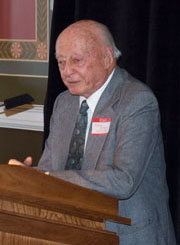| |
|||
|
Folklorist, Writer, and Activist Stetson Kennedy Dies at 94by Stephen Winick
With great sadness, the American Folklife Center announces the death of folklorist, writer and activist Stetson Kennedy. Kennedy was a native of Florida who made many contributions to folklore studies and American life, and created unique and compelling field recordings of multicultural Floridians for the Library of Congress. According to AFC's director, Dr. Peggy Bulger, Kennedy collected folklore not only to preserve it for the future, but to improve the world. "He was a pioneering folklorist, a great writer, and a fearless activist, and he saw it as his primary role to make the world a better place, and to increase cultural equity for all people," Bulger said. "Folks not only in Florida, but across the country and around the world, will miss him a great deal." Kennedy was born in Jacksonville in 1916, and died in a hospital near that city on August 27, 2011. Kennedy was best known for risking his life to infiltrate the Ku Klux Klan during the 1950s as an undercover agent for the Georgia Bureau of Investigation. He learned the secret organization's beliefs and codes, and then leaked that information to columnist/broadcaster Drew Pearson who, in turn, exposed the Klan's nefarious work to the American public. Kennedy's book, which was originally published in 1955 as I Rode with the Ku Klux Klan, and later republished as The Klan Unmasked, tells that story against the backdrop of African American human rights. Long before his work on the Klan, Kennedy was an important contributor to the field of folklore and to the collections at the Library of Congress. Kennedy's father was a furniture merchant, and sold basic items on credit for one dollar down and one dollar a week, sending young Stetson door to door each week to collect. In addition to the money, Stetson began collecting both white and African American folklore on his rounds, becoming an accomplished amateur folklorist while still in his teens. He left the University of Florida in 1937 to join the Works Progress Administration's (WPA) Florida Writers' Project, and was soon, at the age of 21, put in charge of folklore, oral history, and ethnic studies. His team conducted field research of unprecedented depth and breadth, resulting in the documentation of hundreds of traditional stories, songs, items of occupational culture, and other aspects of Florida's diverse cultural heritage. The most famous of the folklorists who worked under Kennedy's direction was the celebrated African American novelist and playwright, Zora Neale Hurston. The research done by Kennedy, Hurston and others was carried out from 1937 to 1942, and it produced one-of-a-kind sound recordings of ordinary men and women, plus photographs, researchers' notes and reports, and other documentary materials, which are now preserved at the Library of Congress. The recordings document not only the expected Anglo-American and African-American cultures, but also many other ethnic groups that had a strong presence in Florida in the 1930s and 1940s, including Seminole Indians and Americans of Bahamian, Cuban, Czech, Greek, Italian, Minorcan, Slovak, and Syrian descent. Those recordings, along with an essay by Kennedy, can be found online at the Library of Congress website: Florida Folklife from the WPA Collections, 1937-1942. Kennedy began his writing career as a contributor to the 1939 WPA guide Florida: A Guide to the Southernmost State. He later wrote Palmetto Country (1942), a detailed survey of Florida folklife derived from the data collected by his Florida Writers' Project team and preserved in the AFC's archive. At the time, Alan Lomax of the Library of Congress commented, "I very much doubt that a better book about Florida folklife will ever be written." Kennedy's friend Woody Guthrie added, "[Palmetto Country] gives me a better trip and taste and look and feel for Florida than I got in the forty-seven states I've actually been in body and tramped in boot." Other books by Kennedy include Southern Exposure (1946), The Jim Crow Guide to the U.S.A.: The Laws, Customs and Etiquette Governing the Conduct of Nonwhites and Other Minorities as Second-Class Citizens (1973), and After Appomatox: How the South Won the War (1995). His most recent book, Grits & Grunts (2008), is a collection of memories from Depression-era Key West. Throughout his life, Kennedy forged friendships with prominent writers, philosophers, and folklorists, including not only Lomax and Guthrie but also Richard Wright, Jean Paul Sartre, Simone de Beauvoir, Marjoie Kinnan Rawlings, Studs Turkel, Langston Hughes, Howard Fast, Alice Walker, and Archbishop Desmond Tutu. Beginning in the 1950s, Kennedy shared a deep friendship with Guthrie, himself a legendary singer, songwriter and social activist. Guthrie was a frequent visitor to Kennedy's twenty-acre home, "Beluthahatchee," south of Jacksonville, where he wrote the final draft of his autobiography. In 1950, Guthrie wrote a song entitled "Stetson Kennedy," encouraging Floridians to vote for Kennedy for U.S. Senator as a write-in candidate. Although the song is an obscure bit of Guthrie trivia, in 2000 it was recorded by the American alternative rock band Wilco and the English folk-punk singer Billy Bragg, on their second collaborative album of Guthrie's songs, Mermaid Avenue, Volume II. In the past several years, Kennedy has visited the Library of Congress twice to take part in AFC events. On May 24, 2005, he was interviewed by Bulger for the Center's Benjamin Botkin Folklife Lecture series, in a presentation entitled "A Conversation with Stetson Kennedy" (57 minutes). On March 14, 2008, he was interviewed by AFC's David Taylor on his role at the Florida Writers Project, as part of AFC's symposium "Art, Culture, and Government: The New Deal at 75" (introduced at time code 3:35:00, interview concludes at 4:03:30, 28 minutes). Select the links to view these interviews. Both are available as streaming video webcasts on the Library's website (RealMedia). |
| ||||

